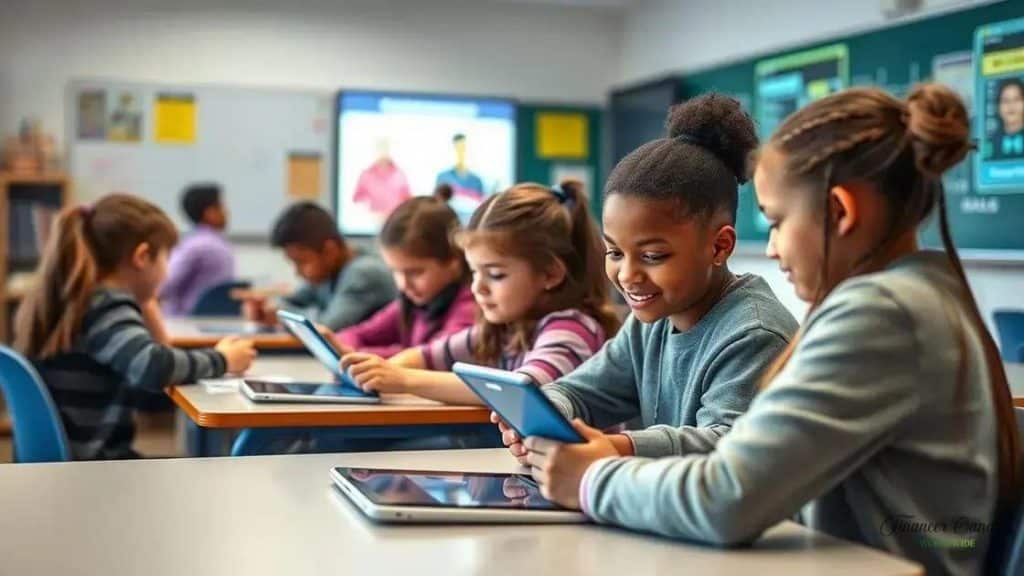The role of edtech startups in reshaping classrooms

The role of edtech startups in reshaping classrooms is significant, as they leverage technology to enhance learning experiences, promote personalized education, and foster collaboration within educational environments.
The role of edtech startups in reshaping classrooms is more significant than ever. Have you noticed how technology is becoming essential in education? Let’s explore how these innovative companies are changing the way students learn.
Understanding edtech startups
In today’s fast-paced world, understanding edtech startups is crucial for grasping how education is evolving. These companies are combining technology with education to enhance learning experiences for students and educators alike. They are making classrooms more interactive and engaging.
Many edtech startups focus on innovative solutions that cater to various educational needs. For instance, online learning platforms have taken center stage, allowing students to learn from anywhere with just a device and an internet connection. This flexibility is reshaping how students approach education.
Key Features of Edtech Startups
Edtech startups often incorporate unique features that differentiate them from traditional educational approaches. Some of these include:
- Personalized learning experiences
- Real-time feedback for students
- Access to diverse resources and materials
- Gamification of learning
These aspects make learning more engaging and allow students to progress at their own pace. Moreover, edtech startups are continually seeking ways to improve their offerings through innovative technologies.
Challenges Faced by Edtech Startups
Despite their potential, edtech startups face several challenges in the competitive educational landscape. For one, they must constantly adapt to changing technologies and pedagogical trends. Many companies may struggle with:
- Securing funding for their projects
- Identifying the right market fit
- Competing with established educational institutions
- Ensuring data privacy and security
These challenges can pose significant obstacles, yet they also drive innovation and improve educational solutions. As the landscape evolves, it’s essential for edtech entrepreneurs to stay agile and responsive to the needs of educators and learners.
In summary, edtech startups are at the forefront of a transformative movement in education. They are leveraging technology to enhance learning experiences, yet they also face obstacles that require continuous adaptation and innovation.
Key innovations by edtech companies

Key innovations by edtech companies are transforming how students learn and engage with educational content. These companies are developing tools and technologies that not only enhance the learning experience but also make it more accessible for everyone.
One notable innovation is the introduction of adaptive learning technology. This technology customizes learning experiences based on individual student performance. It helps identify strengths and weaknesses, allowing students to focus on areas that need improvement.
Interactive Learning Platforms
Another significant development is the rise of interactive learning platforms. These platforms encourage active participation, turning traditional lectures into engaging sessions. Features include:
- Live quizzes that provide instant feedback
- Social learning tools that foster collaboration
- Gamified elements that motivate students
- Video content that enhances understanding
Such innovations are reshaping classrooms by promoting a more dynamic learning environment.
Virtual Reality in Education
Moreover, edtech companies are leveraging virtual reality (VR) to create immersive learning experiences. With VR, students can explore historical sites, conduct virtual science experiments, and more without leaving the classroom. This type of engagement can significantly enhance retention and make subjects more exciting.
Integration with artificial intelligence (AI) also plays a pivotal role. AI-driven tools can provide personalized recommendations for resources based on a student’s learning habits. This data-driven approach can lead to better learning outcomes.
The continued evolution of these innovations reflects edtech companies’ commitment to improving education. By focusing on enhancing engagement and accessibility, they are helping to create a more inclusive educational landscape.
Impact of edtech on traditional classrooms
The impact of edtech on traditional classrooms is profound and far-reaching. As technology continues to evolve, it reshapes how teachers instruct and how students learn. This dynamic shift allows for enhanced engagement and improved educational outcomes.
One major effect of edtech is the integration of digital tools in daily lessons. Teachers are using interactive whiteboards, tablets, and online resources to create a more engaging learning environment. This tech-savvy approach helps to keep students interested and motivated.
Benefits of Edtech in Classrooms
There are several notable benefits of implementing edtech in traditional settings:
- Access to vast online resources enhances curriculum.
- Real-time feedback helps both teachers and students.
- Collaboration tools encourage teamwork and communication.
- Personalized learning paths cater to individual needs.
These advancements enable students to learn at their own pace while discovering various subjects in depth.
Challenges Faced by Traditional Classrooms
However, the shift to edtech is not without challenges. Some educators may struggle with adapting to new technologies while maintaining their traditional teaching methods. Limited access to internet or devices can also hinder the implementation of digital tools.
Additionally, there may be concerns about screen time and its effect on students. Balancing technology use with traditional learning is essential to ensure a holistic educational experience.
In conclusion, the impact of edtech on traditional classrooms is significant. While there are challenges to face, the benefits can lead to more engaging and effective educational experiences for learners.
Challenges faced by edtech startups

Challenges faced by edtech startups are numerous and can impact their growth and success. One significant hurdle is securing funding. Many edtech companies rely on investments to develop their products, but attracting investors can be tough in a competitive market.
Another major challenge is navigating regulatory requirements. Each region has different laws regarding education technology, and staying compliant can be complex. Startups must ensure their products meet these regulations to gain acceptance in schools.
Technological Adaptation
Technological adaptation also poses a challenge. As technology evolves rapidly, edtech startups must constantly innovate to keep up. This can strain resources, especially for smaller companies with limited teams and budgets.
- Ensuring software stability and security can be resource-intensive.
- Integrating with existing school systems may require additional development work.
- User training is essential for effective implementation but can take time.
- Creating engaging user experiences is key for retention.
Moreover, having not just a good product but also a solid marketing strategy is crucial. Many startups struggle to create awareness and differentiate themselves in a crowded market. Developing a clear value proposition is vital.
Competition and Market Demand
Lastly, competition in the edtech space is fierce. Startups must recognize changing market demands and adapt accordingly. This means listening to educators and students to improve their offerings. Keeping an eye on trends and emerging technologies is necessary to remain relevant.
As the landscape changes, edtech startups need resilience and adaptability to thrive. Overcoming these challenges can lead to innovative solutions that ultimately enhance the learning experience.
The future of education technology
The future of education technology looks bright and full of potential. As advances in technology continue to emerge, the way students learn will radically change. Innovative tools are set to enhance the educational experience, making it more engaging and accessible for everyone.
One significant trend is the rise of artificial intelligence (AI) in the classroom. AI can personalize learning experiences, adapting to each student’s pace and learning style. By analyzing data, AI systems can identify areas where students excel and where they might need extra help.
Growth of Online Learning
Another major aspect is the growth of online learning platforms. These platforms allow students to learn from anywhere, providing flexibility that traditional classrooms cannot offer. They can access a wide range of courses and materials, making education more diverse and inclusive.
- Students can choose subjects that interest them more.
- Learning can happen at any time, fitting their schedules.
- Collaboration with peers from different backgrounds enriches their experience.
- Affordable options create opportunities for those who might not have access otherwise.
Furthermore, as technology advances, we can expect virtual and augmented reality to become more prominent. These tools immerse students in interactive environments, allowing them to explore concepts in a hands-on manner. Imagine studying history by virtually walking through ancient ruins!
Collaboration Between Edtech and Schools
The future also holds exciting possibilities for collaboration between edtech startups and traditional educational institutions. Schools will increasingly adopt tech solutions to enhance learning effectiveness. This partnership can lead to tailored solutions that meet specific needs.
As the educational landscape evolves, it is vital for both educators and technology developers to work together. By prioritizing student needs, they can create innovative solutions that make learning enjoyable and effective.
FAQ – Frequently Asked Questions about Edtech Startups
What are edtech startups?
Edtech startups are companies that use technology to create solutions for educational challenges, such as improving access to learning and enhancing student engagement.
How is technology changing the classroom experience?
Technology is making classrooms more interactive and personalized, allowing students to learn at their own pace and access a wealth of resources online.
What challenges do edtech startups face?
Edtech startups often encounter challenges like securing funding, navigating regulations, and competing in a crowded market.
What is the future of education technology?
The future of education technology includes advanced tools like AI and virtual reality, which aim to create more engaging and effective learning environments.





